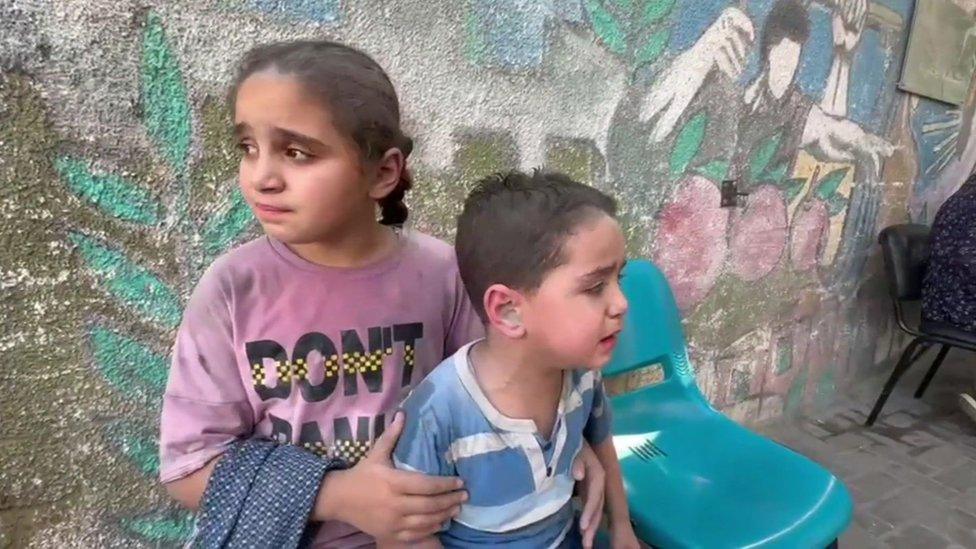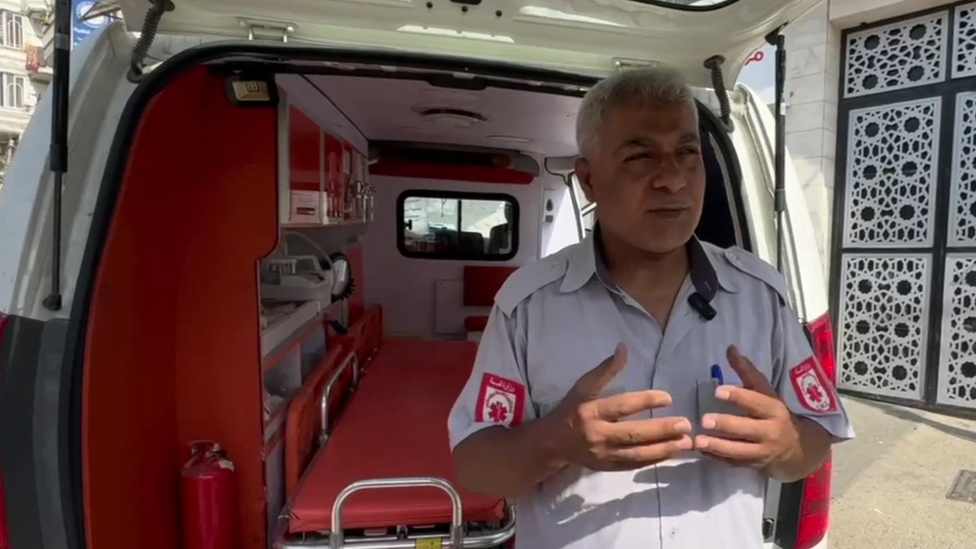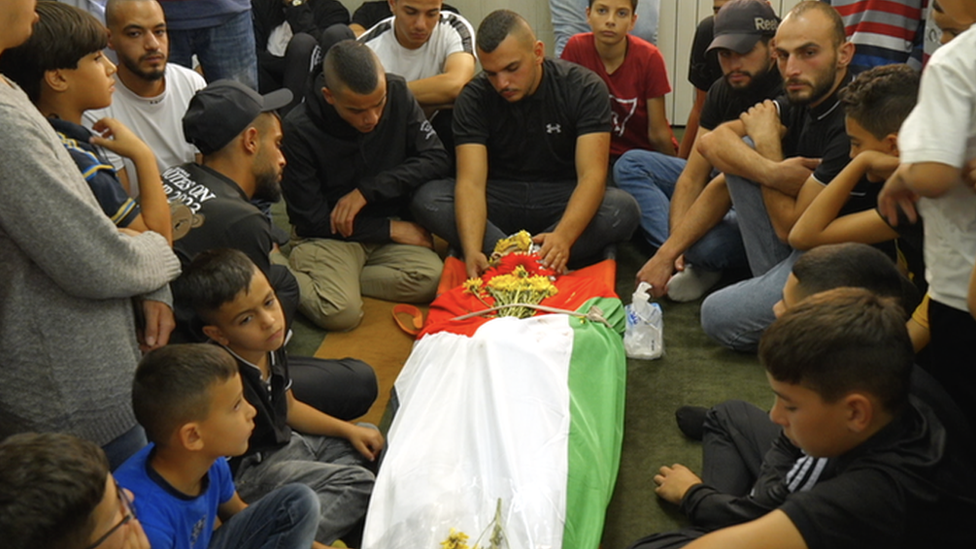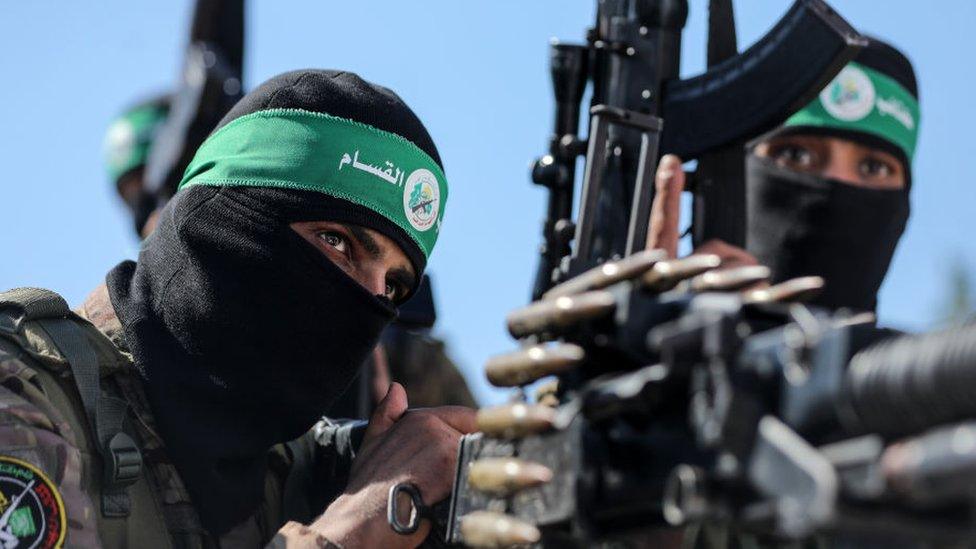Humanity blasted and broken: Gaza through a medic's eyes
- Published
Watch: Fergal Keane reports on the 'carnage' emergency services are facing in Gaza
Warning: This article contains distressing content
There is nothing on his face to convey what he has seen.
The lifeless bodies of children pulled from the rubble. The tents filled with the dead wrapped in white shrouds. Buildings flattened by the devastating force of air strikes. Mahmoud Badawi has seen humanity blasted, burned and broken.
"There are many hard situations," he says. "As an ambulance driver you get used to what is happening. Whether it's hands, heads or bodies that are cut… we are used to this."
His ambulance races from one scene of carnage to another. In a narrow alley in Gaza, he stops to collect two child casualties of an air strike. A man approaches holding a bundle in his arms. It is a boy who has been badly wounded.
He calls out to a friend who is helping the emergency workers load the casualties, urging him to take extra care with the boy.
"Nasser, his head is open."
Yet Mahmoud retains his composure. It is not that he is unmoved by all he sees but that necessity demands he focus on those who can be saved. As he speaks to a BBC journalist, there is the sound of a missile exploding.
"We do not rest a lot with all that is happening. The situation is very bad. Now we will try to locate the bombed area to go to the injured and the dead."
Asked what is the situation with medical supplies Mahmoud says starkly: "Everything is going."

Some 40% of Palestinians killed in Gaza are reported to be children
According to the Hamas-led health authority in Gaza, more than 6,000 Palestinians have been killed in the last two weeks. Some 40% are reported to be children.
The UN has warned that nearly a third of hospitals and two thirds of primary health care centres have had to close "due to damage from hostilities or lack of fuel". The UN says its fuel stocks are running out and that "tough choices" will have to be made about what services they prioritise in the coming days.
Israel refuses to allow fuel into the Gaza Strip because it says supplies might be taken by Hamas. It also says the organisation is hoarding fuel.
In Gaza the days and nights blend remorselessly into each other. The war is constant and in this small strip of land - Gaza's total land area is only 141 sq miles (365 sq km) - it is everywhere.
Israel has ordered around one million residents in the northern half of Gaza to evacuate south. It says this is to enable its forces to target Hamas. But there are continuing Israeli air strikes on southern Gaza, where thousands have fled.
Whether to run; where to run; where to shelter if you do run - every day and night in Gaza is filled with desperate choices.
It also means that for emergency workers there is no going home to a safe place.
When he is out working Mahmoud worries for his wife and six children just as they worry for him. When the bombing is heavy he tries to call every hour. But telephone communication is difficult.
"Connecting with the family is very hard. We barely have service to be able to call and know if they are okay or not."

Mahmoud says he is used to seeing badly wounded people
Mahmoud has worked hard to raise a family with strong aspirations to serve society. He is proud of his children. There is a daughter studying to be a doctor. She is inspired by her father's work and her own experience of war in Gaza as a child. There is also a son who is a nurse. And another who has qualified as a teacher.
As night comes there is a lull in the bombing. Mahmoud pauses and stands between his ambulance and a pile of rubble. He is holding a stretcher in his left hand, waiting for the next emergency. The adrenaline has subsided. He is briefly motionless and his eyes look off into the distance. They are filled with sadness for all he has seen.

More on Israel-Gaza war
Follow live: Latest updates
Explained: What is happening in Israel and Gaza, and why now?
History behind the story: The Israel-Palestinian conflict

With additional reporting from Majdi Fathi in Gaza and Morgan Gisholt Minard, Alice Doyard, Haneen Abdeen and Tim Facey in Jerusalem
Related topics
- Published25 October 2023

